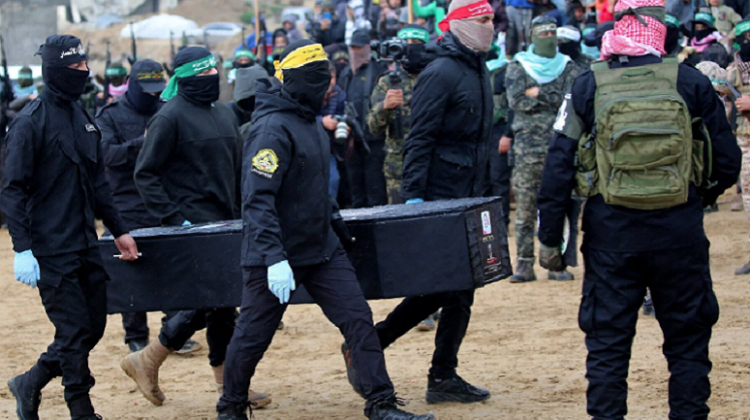‘A Love for Religion and Death’
Why Israel’s foes are so savage.

|
Getting your Trinity Audio player ready...
|
[Want even more content from FPM? Sign up for FPM+ to unlock exclusive series, virtual town-halls with our authors, and more—now for just $3.99/month. Click here to sign up.]
If any other nation had been subjected to Hamas’ appalling celebration at the handover of the bodies of the small boys Ariel and Kfir Bibas, as well as of septuagenarian Oded Lifshitz and the body of a woman they initially claimed was Shiri Bibas, the mother of Ariel and Kfir, and if any other people had perpetrated it, the international outrage would be universal and ongoing. But because the Israelis, who have been subjected to an unprecedented campaign of international vilification, were the victims and Palestinian Arabs, who have likewise been the beneficiaries of an unparalleled propaganda initiative, were the perpetrators, the world remains largely indifferent.
Nevertheless, it is important to understand why Hamas engages in such gleeful and unapologetic barbarism, because what happened at the handoff of the coffins of the hostages was not singular and anomalous. The beliefs that gave rise to this behavior will give rise to similar displays in the future. The civilized world, or what’s left of it, will not be able to confront and put an end to this behavior in any effective manner if it doesn’t fully understand why it happens in the first place.
The wellsprings of Hamas’ barbarism, however, are found in an area that mainstream Western analysts routinely ignore and discount, and insist has nothing really to do with the conflict. These analysts, however, are neglecting to recognize the importance of the fact that in virtually every discussion of the Israeli-Palestinian conflict that comes from Hamas or any of its allies, Islam is central. To pretend, then, that Islam plays no role in the conflict is simply to continue whistling in the dark.
The root cause of Hamas’ behavior is found in the Qur’an, which says: “Say, O you who are Jews, if you claim that you are favored of Allah apart from mankind, then long for death if you are truthful.” (62:6) The core idea here is that the Jews should prefer the next world with Allah rather than this world, but instead cling to earthly vanities. In the Islamic world, however, the idea of the love of death, combined with the sanctification of violence and killing in the Qur’an (see 2:191, 4:89, 4:91, 9:5, 47:4) has become a veritable cult of bloodshed and murder.
Syrian opposition leader Khatib Badla noted this in 2020, saying: “We [Arabs] have a trait that distinguishes us from all the other peoples of the world, which is a love of death. We dream of it, regard it as a source of inspiration and think about it every day. We love death and love the dead. Instead of hoping for longevity, for [a life of] giving and loving, we say, with defeatism… ‘God, [help me] go to battle and reach my grave. This is in addition to the grand slogans we [like to chant], such as: ‘death to America,’ ‘better death than humiliation’ and ‘seek death and you shall be given life [in the next world].’”
Khatib Badla is right. Islamic jihadis idolize murder and love death, as they frequently affirm. Boston jihad killer Dzhokhar Tsarnaev wrote: “you are fighting men who look into the barrel of your gun and see heaven.” Muslim teenage girls from Austria who traveled to Syria for jihad announced: “Death is our goal.” Boko Haram leader Abubakar Shekau said: “I’m even longing for death, you vagabond.” He ultimately found it. A Muslim child preacher taunted those he has been taught to hate most: “Oh Zionists, we love death for the sake of Allah, just as much as you love life for the sake of Satan.” Jihad mass murderer Mohamed Merah said that he “loved death more than they loved life.”
Ayman al-Zawahiri’s wife advised Muslim women: “I advise you to raise your children in the cult of jihad and martyrdom and to instil in them a love for religion and death.” And as one jihadist put it, “We love death. You love your life!” And another: “The Americans love Pepsi-Cola, we love death.” That was from Afghan jihadist Maulana Inyadullah.
Loving death is not natural. Loving life is. The Islamic idolization of death leads to displays such as Hamas’ celebration with the hostages’ coffins. Killing them was in itself a victory, even if most of Gaza lay in ruins around them. Their lust for death was for a moment satisfied. They would, however, just want more later.

